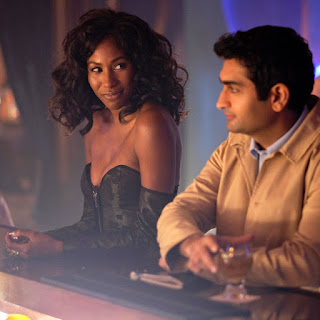 |
| The Misadventures of Awkward Black Girl logo. |
Nothing seems more relatable than the classic The Misadventures of Awkward Black Girl, a two-season web series of 25 must-watch episodes. J (who shares my nickname) has been one of the most iconic characters ever invented, especially for nerdy Black girls looking for quirky images of themselves.
The first episode was an instantaneous "you get me," like when love hits a person in a full, cataclysmic force. After a breakup from a long-time boyfriend, J cuts off her hair, her ex comes back, and doesn't see her as desirable anymore. It brushes on most men's long hair fetishes, equating hair with femininity. The Black community is further problematic. When Black women break free of relaxers and pressings, glorying in their natural hair, Black men weren't necessarily on board at first. For darker skinned women, historically seen as closest to masculinity, wearing cropped hair was foolishly viewed as a great evil. J doesn't let the ex's opinion hurt. Her short hair is a defiant statement that never changes as the series progresses along. In addition to her deep brown skin and beautiful short natural, J represents the average Black woman, our bodies, our interactions with the world around us. Such a golden, honest reflection.
 |
| J (Issa Rae) often found herself in wacky tough spots, but her TWA and earrings were always on point. |
Unfortunately, J has to deal with an awful work environment. Hanna, her boss is an inappropriate culture vulture, Nina is a particularly nasty bully, Germy Patty holds snotty tissues like safety blankets, Darius's whisper voice is irritating, and lovesick A follows J around, not taking the politest of rejection hints. J finds endearing highlights in her best friend CeCe and adorable, seemingly unrequited crush on Fred, the new guy. With CeCe, J has found a great companion, a gal just as awkward as her. In fact, their hallway interactions were delightfully humorous and a spot on testament of office discomfort.
 |
| J (Issa Rae) smiles often, even in situations that don't call for smiling. |
J's other office favorite-- the kind, supportive Sir-Smiles-A-Lot, Fred, then begins a big triangle. She has much in common with anger management counselor White Jay, whom she met at Fred's birthday party. Fred realizes much too late that he likes her. She ultimately has to decide between the two, leading to a sweetly surprising season one finale. If including A and the lesbian receptionist in the whirligig of J's love life, J was quite the catch.
The Misadventures of Awkward Black Girl dishes out a fully thought out curriculum in a smart, refreshing way. It daringly brings up all the things we ever thought about, going over: proper car behavior (if it's someone you don't like or regrettably slept with), dance party etiquette, dating, job interviews, boyfriend's terrible friends, and all those finicky situations in between. Yet displayed through the eyes of a girl that looks so much like us. She doesn't have it quite together. And that is okay. Her rap flows are legendary and her killer internal dialogue is the stuff laughter is made of.
 |
| J (Issa Rae) is every young woman whoever feels out of place-- whether it be at a public function or where we are in our lives (financially, emotionally, physically). |
While network TV has room to catch up to Black women in leadership roles and cable is slowly becoming a space, the web series remains the most solid place to find us. The Misadventures of Awkward Black Girl inspired a longing for other great Black women characters in this short digital format. American Koko's Agent Koko, Sam Bailey's You're So Talented, and Hermione and the Quarter Life Crisis's Black Hermione showcase Black women in all faucets of individuality.
 |
| Issa Rae has taken over HBO with award-winning Insecure and is currently in Little (which reunited Rae and Tracy Y. Oliver-- The Misadventures of Awkward Black Girl's Nina and the web series producer/writer). Up next, Rae stars in The Lovebirds with Kumail Nanjiani and Stella Meghie's The Photograph. Insecure's fourth season has been pushed to 2020. |
Every time the desire to binge The Misadventures of Awkward Black Girl comes on, the temptation cannot be denied. Stories are funnier, wittier. Above all, the world of J will never stop resonating.

























